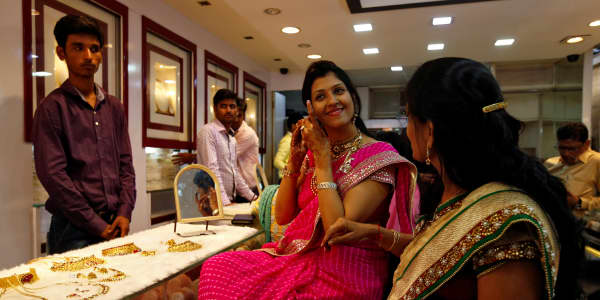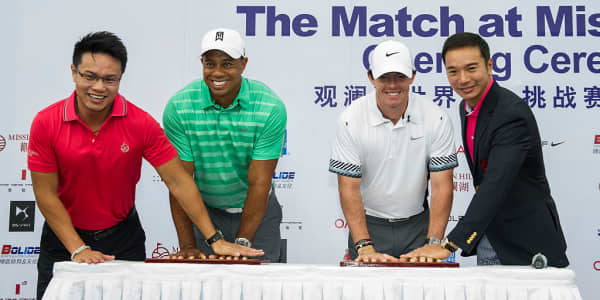More than 45 years ago, when designer Ritu Kumar started out, she was an angry young woman. As she tells it, she was angry that the 200 years of colonial rule had "decimated" India's craftspeople and their work.
"The English and the French copied every weave, every print and it was crazy I had to buy [the Indian prints] back from them…it was a reverse cycle," Kumar told CNBC.
An Indian identity
Operating in an environment that looked to Europe for inspiration, Kumar unearthed the lost crafts of the country to create a fashion brand with an Indian identity that influences the fashion world.
"I had a small exhibition in an hotel in Calcutta of my hand block printed saris and all the women came in painted chiffon saris from France with yards of pearls. It was a complete disaster," recalled Kumar. "The women said my saris looked like their grandmother's bedcovers!" By the 1980s, however, as India became "miraculously aware of its identity" to own a Ritu Kumar outfit for special occasions became a status symbol.
And in 1991, when the Indian economy opened its doors to the world, the brand had its first growth spurt. Ritu Kumar started dressing up India's Miss Universe contestants and Bollywood and international celebrities were spotted wearing her clothes.
"Think of one country that has its own indigenous handwriting, you will have a hard time coming up with one…most fashion is dictated by a multinational group from Paris and New York. In India, fashion is still dependent on textiles and not black Lycra," says Kumar, who deems Indian designers "revivalists" because their fashion still comes from the crafts.
"She championed the cause of Indian textiles, and her clothes for me were a representation of wearable art," contemporary Indian designer Sabyasachi Mukherjee, told CNBC.
The son steps in
A life-changing moment in the history of the brand, however, came in the early 2000s when Kumar's son, Amrish, now 39, inherited his mother's legacy. A former banker with a keen business acumen, Amrish launched a pret (ready to wear) line called Label, in a sharp contrast to what his mother stood for.
"Even though Amrish understood the merit of what we were doing, he didn't think it was meant for the next generation," said Kumar, adding that in the early 2000s India's demographics were changing sharply: A younger, global population was emerging.
For Amrish, who is now the CEO of the Ritu Kumar company, it was important to modernize the brand and cater to a younger, more international consumer.
"Label is inspired by shapes and designs from Paris, but their textiles are basically still very grounded in what is our strength," said Kumar. But many industry old timers say that Label has diluted the Ritu Kumar brand.
Amrish was quick to defend: "Label is a classic sub brand strategy, which aims to expand the scope of the brand by including a larger and younger customer set. If we tried to do this with the parent brand there was a real danger of dilution and distraction."
Three distinct brands still exist within the umbrella brand — RI, the premium bridal and formal wear; Ritu Kumar, the traditional semi-formal wear; and Label —but only the Label brand has been defining Ritu Kumar for the last few years, industry insiders said.
She is no longer the first choice for India's huge bridal wear market, with younger designers taking over the mantle, as Kumar has been criticized for not focusing on innovating within her traditional genre.
Futuristic leap
"Actually, if you ask me about the brand Label, it's fantastic that a designer like her has been able to do something which is so young at her age. But having said that, I also think that she was known for a particular kind of aesthetic and she needs to reinvent more of that," said Mukherjee, who is today a go-to designer for bridal wear in the country.
Kumar is quick to point out that Label is her son's baby: "He has done a futuristic job..I would not have had the energy or interest to take it there…it is a different kettle of fish."
Private equity firm Everstone Capital invested one billion rupees ($16 million) in the firm in 2014, which lends some credibility to the direction the company is taking.
"Nobody has been able to achieve a mass market for designer wear like Ritu Kumar has...and a legacy is all about changing according to the times," Sunil Sethi, president of the Fashion Design Council of India, told CNBC.
The brand is expanding into smaller Indian cities, adding 10 more company stores this year to the existing 50. It is also opening franchises and shop within shops, taking the brand to 100 touch points, according to a company executive.
Ritu Kumar also has outlets in Dubai and Mauritius. "Looks like he [Amrish] is taking it international — it will be good," said Kumar, adding that she has little to do with the actual running of the company, focusing instead on textile research.
A working relationship
"There is a generational shift along with a massive growth in the size and scope of the organization. This will always bring some turbulence," said Amrish when asked about his working relationship with his mother.
Kumar also confessed to having arguments with her son, but said she appreciates what he is doing.
"The pret line is far more challenging…you have to make the aesthetic viable at a price that is more affordable. I never think that only a few should be able to afford good design. This is a very new couture concept that comes to us from Europe that you have to be hugely rich to afford fashion."
While Ritu Kumar inspired generations with her made-in-India fashion, it was still elusive for many. Her son is now trying to bridge the gap.
Catch the second season of Lasting Legacy, Thursdays in June, on CNBC Asia at 17:30 SIN/HK and on CNBC EMEA at 23:30 CET.




